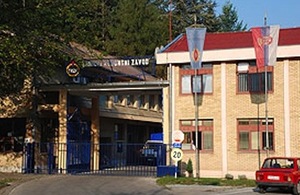Helping Serbia dispose of stocks of surplus munitions
A government-owned demilitarization facility in central Serbia will be further developed to ensure the safe and environmentally responsible disposal of almost 2,000 tonnes of surplus munitions, reducing the risk of explosion from ageing ammunition as well as the risk of proliferation.

Serbia's main demilitarisation facility, Tehnički Remontni Zavod
Seven years ago, an explosion at the ammunition depot in Paracin in October 2006 clearly demonstrated the potential danger to local populations posed by stockpiles of obsolete ammunition. Fortunately there were no casualties but the depot was completely destroyed, most of the windows of the town were blown out and the tremors were felt some 20 kilometres away. Surplus ammunition can also pose a wider security threat should the material fall into the wrong hands.
“Security and stability in the Western Balkans is a high priority for the UK, after the history of the last two decades. So it was natural for our Ministry of Defence to respond positively to Serbia’s request to NATO for assistance in removing its surplus ammunition stockpile,” explains Mariot Leslie, the United Kingdom’s Permanent Representative to NATO.
“We paid for the feasibility study which allowed this project to get underway and the UK accounts for a large part of the funding which has been committed to the NATO Trust Fund so far,” she adds.
With a view to attracting further funding, the project was formally launched on 16 July at a meeting of NATO’s Political and Partnerships Committee in a session that included representatives of the Alliance’s 22 partners in the Euro-Atlantic area.
Apart from the United Kingdom, two partner countries – Ireland and Switzerland – have already committed funds. In addition, the United States has indicated its willingness to make a significant contribution. “That’s a good demonstration of NATO’s ability to use its network of partnerships in an open and collaborative way in support of goals which we all share,” says the British Permanent Representative.
“We are glad that Serbia turned to NATO for help. I see that as real evidence that Serbia takes its Partnership for Peace programme seriously and wants to take advantage of the high standards and interoperability which come from working alongside NATO’s Allies and partners,” she adds.
Building capacity
NATO has carried out similar support over the past decade in several Balkan nations, including assisting Serbia and Montenegro with the disposal of 1.4 million anti-personnel mines in a €1.7 million project that ran from 2005 to 2007.
In late 2011, Serbia requested assistance to further develop the capacity of the defence ministry’s main demilitarisation facility – Tehnički Remontni Zavod (TRZ) – which is located near the town of Kragujevac in central Serbia.
“Within the ongoing defence reform process in Serbia, ammunition surpluses are recognised as a huge and sensitive problem with insufficient capabilities and technologies for overall demilitarization,” says Major General Milan Mojsilovic, the Serbian Military Representative to NATO.
“Although the Serbian Ministry of Defence reduced surpluses over the last years, further efforts should ensure the process is completed more rapidly and in line with the highest safety and environmental standards,” he adds.
The United Kingdom agreed to be the lead nation for the project and asked the NATO Support Agency to carry out a feasibility study. During the first half of 2013, the Agency’s experts worked with the Serbian Ministry of Defence and TRZ Kragujevac to develop the project proposal, which builds on the experience of the 2005/7 project.
“In this project we will work with Serbian experts to develop safe and environmentally responsible methods to demilitarize around 2,000 tonnes of surplus bullets, mortars, rockets and missiles,” explains David Towndrow, the NATO Support Agency’s Project Officer.
Getting started
Once the necessary legal instruments have been signed and sufficient financial donations received, practical implementation will start. With an estimated budget of €3.7 million, the project will improve the technical capability for ammunition demilitarization at TRZ Kragujevac and fund the industrial demilitarization of around 2,000 tonnes of surplus munitions over two years. “The cost of this work will be reduced through the sale of the recovered metals and other valuable scrap materials,” says Mr Towndrow.
Serbia’s contribution to the project will include €450,000 of direct funding to TRZ Kragujevac for demilitarization, the costs of transportation of the munitions from storage to the demilitarization facility, and the provision of office facilities for NATO Support Agency staff in Serbia.
Serbia initially requested for assistance with the disposal of a total of 4,151 tonnes of surplus conventional ammunition. While this was judged to be too big for a single project, an extension of the project could be considered.